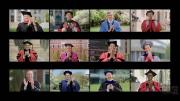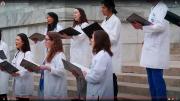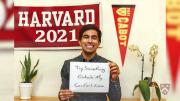Anyone who worked remotely during the past 16 months knows that doing business digitally is fast and productive. More evidence came during “Honoring the Harvard Class of 2021,” on May 27: the second COVID-era virtual graduation program (minus 30,000 people clogging Tercentenary Theatre, it’s not Commencement). President Lawrence S. Bacow and the deans assembled online knocked off the conferring of degrees in about three minutes flat—a fraction of the time it usually takes for deans to doff their caps and bow to the governing boards, augment their austere scripts with jokes, and indulge student cheers, tossing around of school and House symbols, etc.
There were somewhat fewer degrees to confer (some students took leave during this year of remote learning and scarce visas), but turning candidates into graduates may have been turbocharged for pragmatic reasons. Commencement planners, with more time to prepare than during the hectic spring of 2020, reinserted the Latin Salutatory, the traditional student part omitted last year. More important, Harvard conferred honorary degrees on the seven guests who were deprived of that recognition in 2020. That takes time, as does having the guest speaker during the morning exercises—perhaps a logical precedent for the next real Commencement. And how long will people watch a show, even from Harvard, in the era of TikTok and Instagram?
There were other restorations, accommodations, and enhancements during the week. The Baccalaureate was back. This year, unlike last, students were offered a low-cost, green version of academic regalia: perfect for at-home selfies and family photos, and then permanent storage deep in a closet. Given time to film elements of the morning program properly, the Commencement maestros got the sheriff of Middlesex County to strut his stuff, solo, on the Memorial Church platform, somewhat oddly calling the proceedings to order. And the roster of special graduation celebrations doubled, as inaugural First-Gen/Next Gen (first-to-college and lower-income candidates) and Lavender (LGBTQIA+) events joined the recurring Black and Latinx ceremonies.
First things first: despite the academic year’s challenges, Harvard professors pursued their research and taught their students, who in turn fulfilled their requirements. The College conferred 1,292 degrees (down from 1,542 in 2020) and there was a bumper crop of Ph.D.s: 572. Cadets and midshipmen in the 2021 ROTC cohort were commissioned. Exemplary undergraduates were awarded Hoopes Prizes for their capstone projects—among them, one Malia Obama, for “Yellow Light,” a screenplay, supervised by Musa Syeed, Copeland lecturer on English. And once again, according to The Harvard Crimson, among her classmates who indicated in the senior survey that they are entering the workforce (61 percent), a majority have gigs in finance, consulting, and tech (21, 19, and 17 percent, respectively).
That evidence of normalcy and success aside, the week’s rhetoric, spoken and received online, focused on the traumatic times: the pandemic, and the nation’s roiling reckoning with racial injustice and prejudice—past and present.
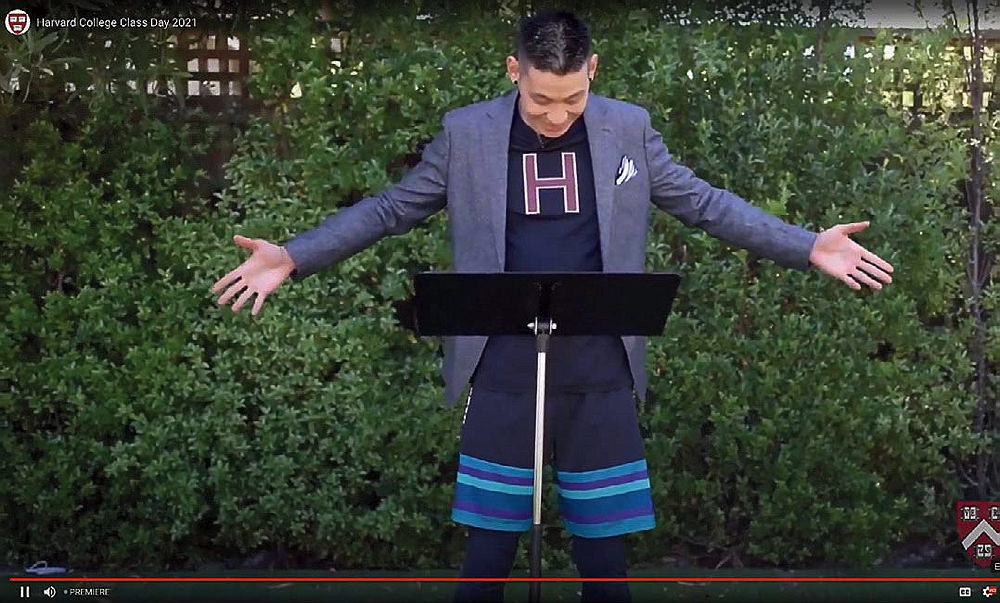
College Class Day star Jeremy Lin
Screenshot by Harvard Magazine
College Class Day speaker Jeremy Lin ’10 spoke personally about his anxieties when he became an NBA star and global celebrity overnight. “After being at the top of the world during Linsanity,” he reflected, “I can tell you that success without community is absolutely meaningless,” a resonant message in an era of social distancing—and of pandemic-linked racism directed at Asians, against which he has become a leading spokesman. Doing the honors at the Law School, where she was once a professor, Senator Elizabeth Warren addressed the spreading “ugliness” that she said the nation has witnessed these past four years. She cited inequality, structural racism, the climate crisis, a broken criminal-justice system, and dangerous misinformation as factors that threaten “to consume us all.” “It’s a grim list to talk about on graduation day,” she conceded. “But this list is why the world needs you.” Read more at harvardmag.com/comm-wed-21.
The pandemic proper was the subject during the Longwood Medical Area’s events. Addressing Medical School master’s degree graduates, Castle professor of medicine Dan Barouch, whose research underlies the Johnson & Johnson COVID-19 vaccine, said it and others reflect the work of basic science: “Some people say they were rushed. I say they were made very efficiently”—but hardly within one year. “They were made over decades,” he emphasized, and represent long-term advances in vaccine platforms, virology, and immunology. World Health Organization Director-General Tedros Adhanom Ghebreyesus urged public-health graduates to “learn to listen,” ask questions, and look for what works “outside your frame of reference”—all necessary to prepare for pandemics to come. For a full report on these and other addresses, see harvardmag.com/comm-thurspm-21.
Elsewhere, the speakers shone a light on the people who have not been listened to sufficiently. At the Latinx celebration, professor of education Roberto G. Gonzales (who noted his own leave-taking, for a University Professorship at Penn) depicted the “daunting” reality facing students not about to receive a Harvard diploma: “For every 100 Latino students, 60 graduate from high school, 12 will receive their bachelor’s degree, three will receive a graduate degree, [and] .03 will earn a doctorate.” And in a panel discussion on achieving gender equity that preceded conferral of the Radcliffe Medal on Melinda French Gates (see harvardmag.com/comm-rad-21), Pratt professor of business and governance Iris Bohnet homed in on the “intention-action gap”: “It is hard to just rely on virtuous intentions; you really have to give people tools to live up to them.”
These themes came together with unexpected power in the skillfully choreographed “Honoring” program Thursday morning. Bacow, filmed in his presidential gown at a lectern beside Massachusetts Hall, set the tone gently by observing that he was outside his office— “where I haven’t been for 440 days—and counting.” Appraising the past year, he invoked the alma mater, with the ages past and waiting before, to put “the vexing present into a more welcome context.” He asked the graduates-to-be to “delight in the company of those who cheered you up and cheered you on”—many of whom had been forced together as “unexpected suitemates” at home during a year of very distanced learning. After pausing so that viewers could thank their family members and friends, he extended the hope that the students’ destinies, “like our beloved University’s,” would be “onward and bright.”
Then, as often, the student speakers seized the day. Latin Salutatorian Jordan Bliss Perry ’21, recorded in an empty Tercentenary Theatre, noted that it was oddly “not adorned with festive banners” and that his audience sat “not amidst a sea of thousands of comrades but in the boxed grid of a virtual meeting room.” His academic interests—he is a joint concentrator in classics and computer science—led to a larger message about Harvard’s strengths as a place where “it is not only in science but also in the humanities that we have grown.”
Silvana Gómez ’21, turning from the classics and ages that are really past, remembered the “unique struggles and barriers” that faced low-income and first-generation students as the campus suddenly shut in March 2020, and how those communities came together in mutual support. Since then, she said, “We have watched as a failed healthcare system has compromised the lives of those who are a part of unhoused communities, undocumented communities, low-income communities and every other human being who has been denied equal access to healthcare during this time of crisis. We’ve been witness to the murders of Black people by those sworn to protect them….” She declared it was up to members of the class of 2021 to “lead the change towards a new normal.”
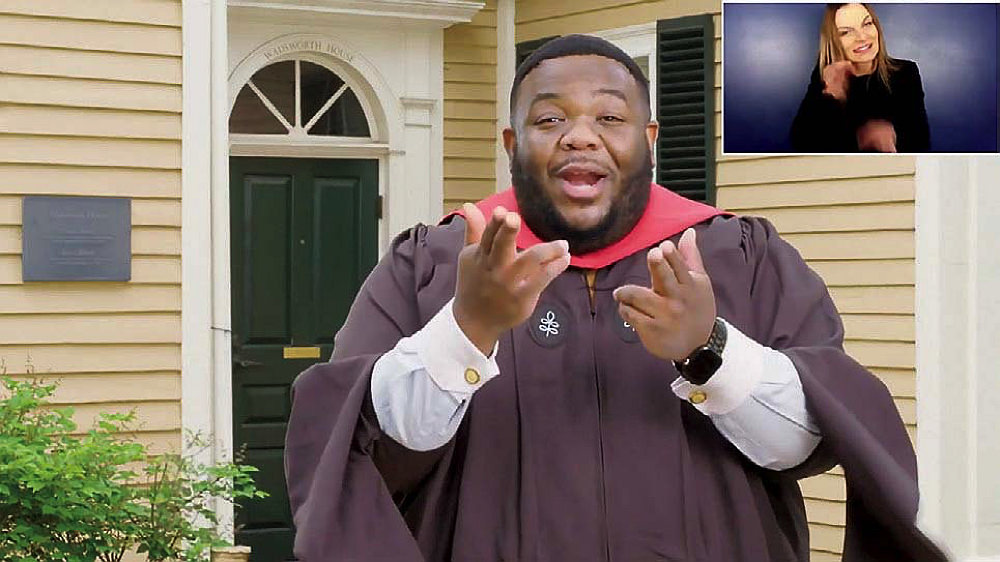
Vincent H. Bish Jr.
And with Wadsworth House behind him—the tablet affixed there in 2016, documenting four slaves owned by Harvard presidents in the 1700s, was visible over his shoulder—Vincent H. Bish Jr., Ed.M. ’21, delivered a stem-winding, preacherly exhortation. Describing himself as “gobsmacked” by the plaque, he all but thundered, “My directive to you on this beautiful morning is simple. Place the force of your intellect somewhere it might disrupt a system, and shake more fairness loose.” His peroration commanded, “Live lives that carry the name of Harvard like a benevolent torch into the next century…That we may not only be the bearers great of privilege, but the breakers of powerful yokes as well.”
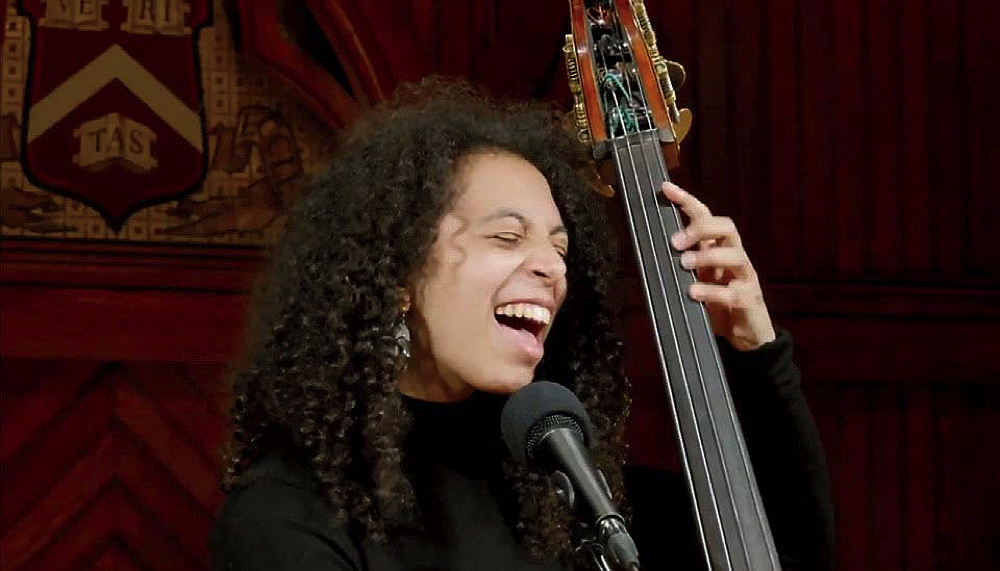
Devon Gates ’23 solos “Stand by Me.”
Screenshot by Harvard Magazine
The first musical interlude, an achingly emotive “Stand by Me” sung by Devon Gates ’23, self-accompanied on the bass on an otherwise empty Sanders Theatre stage that underscored the lyrics, was a vivid anthem for months of social distancing. The second interlude, after the honorary degrees, proceeded from darkness toward the emerging light. The original work by Medical School lecturer and emergency-medicine attending physician Jeremy S. Faust, based on the Song of Solomon (“For behold, the winter is past…the time of singing has come”), was sung by a chorus of medical personnel; they evoked those who provided COVID-19 care, did the research that produced vaccines, and embodied the strengths of people working together on the behalf of the wider community.
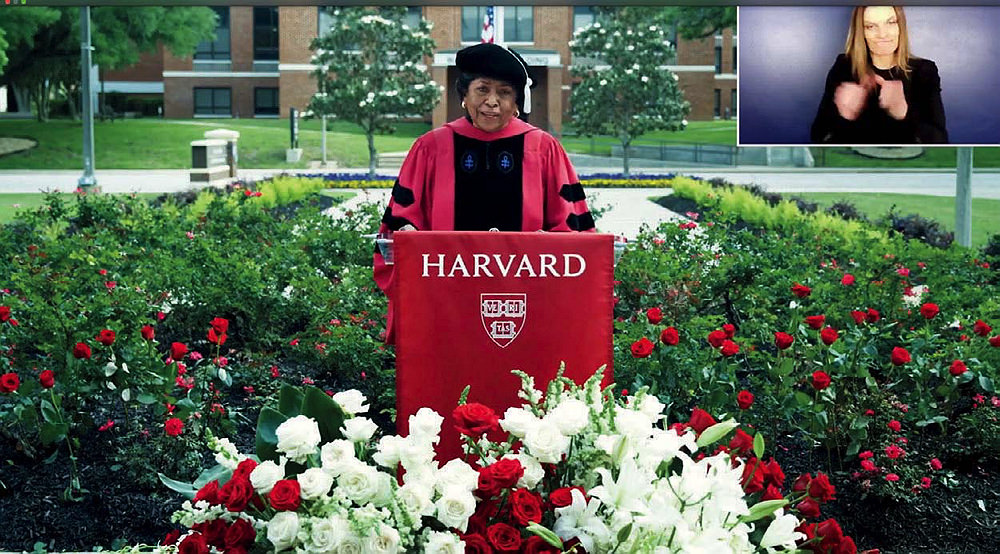
Ruth J. Simmons
Screenshot by Harvard Magazine
Guest speaker Ruth J. Simmons, Ph.D. ’73, LL.D. ’02—wearing her Harvard doctoral gown, speaking from Prairie View A&M, an historically black institution where she is now president (following her Smith College and Brown University presidencies)—wove all those strands together, drawing on her life and her perspectives on higher education. Her address swept from her youth (“Growing up on a constant Jim Crow diet that offered assertions of my inferiority”) to the opportunities afforded her—not without challenge—at Harvard. Almost in sorrow, as if echoing Bacow on the “vexing” present, she said, “Today, after decades in the academy, my path has taken me back to a place where students are waging the same battles that were so hard fought when I was a teenager: safe passage in the face of bigotry, the right to vote, and equal access to educational and professional opportunities.” She called on the new graduates to “acknowledge and address the historic biases and inequities that so many continue to experience…For it is never too late to do justice.”
Nor did she exempt Harvard from its institutional obligations. “While universities like Harvard had the wind at their back,” she said, “HBCUs [Historically Black Colleges and Universities] often had gale force winds impeding their development.” Accordingly, she said bluntly, “I ask the university that did so much for me to add to its luster by embracing the opportunity to stand alongside these historic…institutions…and elevate the fight for parity and justice to the level it deserves.”
Simmons concluded by putting the graduates’ moral challenge in stark terms: “Today, you earn your laurels as a scholar. Taking up the cause of justice, you will earn your laurels as a human being.”
A full account of the program appears at harvardmag.com/comm-thursam-21.
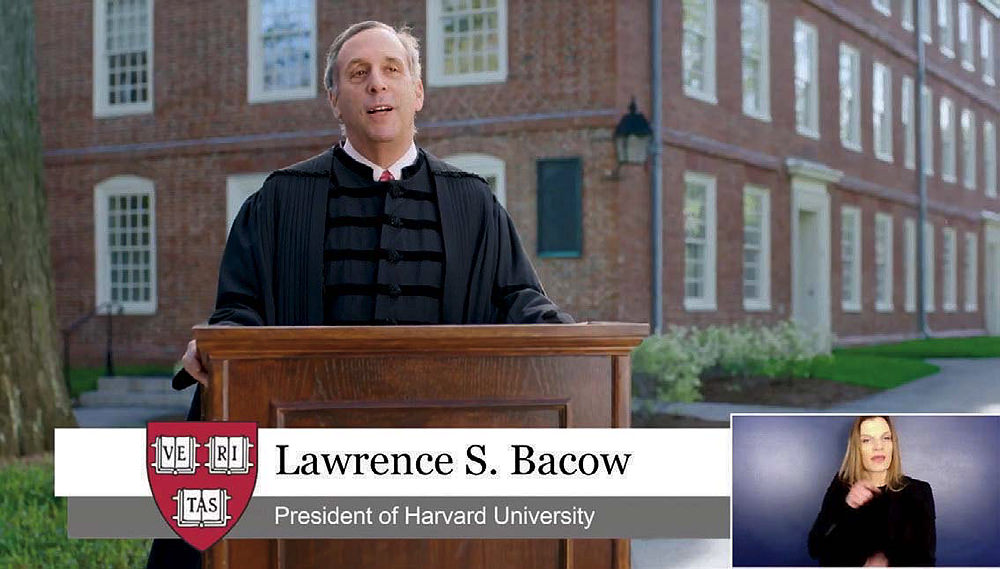
Lawrence S. Bacow
Screenshot by Harvard Magazine
Against the backdrop of the isolating pandemic and the raw disparities (racial and otherwise) it brought sharply into view, there was an underlying message about the fundamental importance of human connection and caring. President Bacow expressed it best in his Baccalaureate talk. Speaking to the College seniors two days before graduation, he offered as the wisdom dispensed on such occasions “three imperatives”:
“First, do not hesitate to connect.…
“Second, do not hesitate to love. You have formed relationships with one another that will see you through a lifetime. Find ways to stay connected so that you can support one another during all of life’s passages.…
“Third, do not hesitate to live.…you must be wary of paths that you know are not your own.…”
What those charges have in common, he said plainly, is “other people.”
After the unwanted precedent of two virtual graduations, the University will be grateful for real, peopled Commencements to resume—next May 26, one hopes. But it won’t be a simple return to the status quo ante: given promised in-person ceremonies for the classes of 2020 and 2021, graduation week and weekend will be a three-fer. A new normal indeed. vjohn s. rosenberg
Complete coverage appears at harvardmag.com/comm-texts-21. For a report on the Harvard Alumni Association annual meeting (held after this issue went to press), featuring President Bacow and poet Kevin Young ’92, director of the National Museum of African American History and Culture, visit harvardmag.com/comm-haa-meeting-21.
